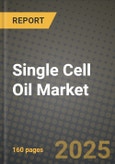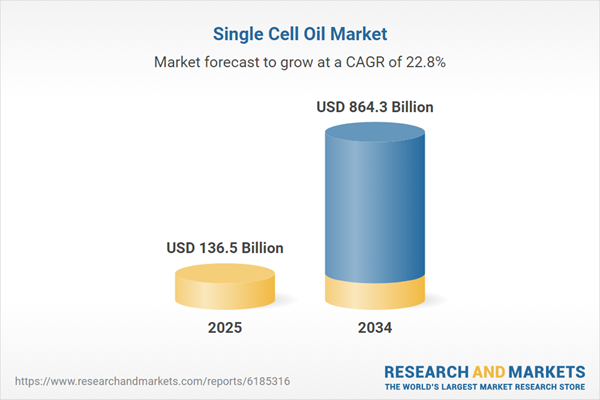The single cell oil (SCO) market is gaining traction as a sustainable alternative to traditional plant- and animal-based oils, primarily driven by its applications in food, nutraceuticals, animal feed, biofuels, and cosmetics. SCOs are derived from microbial sources such as algae, fungi, and yeast, and are rich in essential fatty acids like omega-3 and omega-6. These oils are especially valued for their high nutritional profile, clean production process, and ability to be cultivated on non-arable land, making them environmentally favorable. As consumers and industries seek cleaner, cruelty-free, and resource-efficient options, SCOs are increasingly seen as a viable solution to meet growing demand for healthy fats and sustainable oils. Moreover, their compatibility with biotechnological production methods allows for scalable and controlled yields, supporting consistent product quality. These factors are making single cell oils increasingly attractive for both functional food innovation and industrial applications.
The single cell oil market saw increased momentum, driven by a growing interest in alternative proteins and sustainable fats. Several biotech companies expanded their commercial-scale fermentation facilities to meet demand for DHA- and EPA-rich oils derived from algae and fungal strains. Nutraceutical companies focused on SCOs as plant-based omega-3 alternatives, targeting vegan and health-conscious consumer segments. In the animal feed sector, SCOs gained popularity as replacements for fish oil in aquaculture, improving sustainability and reducing pressure on marine ecosystems. Cosmetics and personal care brands incorporated microbe-derived oils into skincare formulations due to their purity, stability, and hypoallergenic properties. Regulatory bodies in the U.S., Europe, and parts of Asia issued new guidelines and approvals for food-grade and pharmaceutical-grade SCOs, encouraging broader market entry. However, high production costs and competition from well-established plant oil markets remained key barriers, especially in price-sensitive regions.
The single cell oil market is expected to experience strong growth as advances in synthetic biology and precision fermentation drive down production costs and increase yields. Emerging applications in biofuels and industrial lubricants are likely to boost demand for high-lipid microbial strains engineered for specific fatty acid profiles. As the global population grows and arable land becomes more limited, SCOs will play a key role in decoupling oil production from traditional agriculture. Investment in R&D will focus on improving carbon efficiency by utilizing waste gases or lignocellulosic biomass as feedstock for microbial oil production. Strategic partnerships between biotech firms and food conglomerates will accelerate product innovation, bringing SCO-enriched foods and beverages to mainstream markets. Despite these opportunities, scalability challenges, consumer awareness, and regulatory harmonization across regions will continue to influence the market’s pace of adoption and long-term viability.
Key Insights: Single Cell Oil Market
- Increasing adoption of algae- and yeast-derived oils in vegan and plant-based nutritional supplements for their omega-3 content.
- Expansion of SCO usage in aquaculture feed to reduce dependency on fish oils and improve marine sustainability.
- Integration of single cell oils in cosmetics and personal care products due to their purity, bioactivity, and hypoallergenic nature.
- Development of next-gen microbial fermentation platforms optimized for high lipid yield and lower energy consumption.
- Growing consumer interest in climate-friendly and non-GMO oil alternatives pushing innovation in microbial oil production.
- Rising demand for sustainable and resource-efficient oil sources amid environmental concerns and limited agricultural land.
- Growing awareness of the health benefits of omega-3 fatty acids fueling interest in SCOs as clean-label nutritional options.
- Technological advancements in bioprocessing and fermentation enabling scalable production with reduced environmental impact.
- Supportive regulatory frameworks and food safety approvals facilitating commercialization of microbial-derived oils in food and pharma.
- High production costs and process complexity remain key challenges, making it difficult for SCOs to compete with conventional plant-based oils on price - particularly in commoditized segments like cooking oil, bulk feed, or industrial biofuels where cost-efficiency is paramount.
Single Cell Oil Market Segmentation
By Micro-organism
- Bacteria
- Yeast
- Microalgae
- Fungal
By Grade
- Fuel
- Feed
- Food
By Raw Material
- Sugarcane Mill
- Agro-Industrial Waste
By Application
- Bio-Fuel Feedstock
- Fish Oil Substitute
- Functional Oils
- Animal Feed
- Infant Formulae
- Pharmaceutical Products
- Aquaculture
Key Companies Analysed
- Royal DSM N.V.
- Goerlich Pharma GmbH
- DIC Corporation
- Cellana Inc.
- Cargill Incorporated
- Alltech Inc.
- Xiamen Huison Biotech Co. Ltd.
- Qingdao Seawit Life Science Co. Ltd.
- Bioriginal Food & Science Corp.
- Novosana BV
- Hubei Xinhe Biotechnology Co. Ltd.
- The Lubrizol Corporation
- Corbion NV
- Aurora Algae Inc.
- TerraVia Holdings Inc.
- Solazyme Inc.
- Algix LLC
- Sapphire Energy Inc.
- Heliae Development LLC
- Algenol Biofuels Inc.
- Blue Marble Biomaterials LLC
- Elevance Renewable Sciences Inc.
- Solix Biofuels Inc.
- OriginOil Inc.
- Joule Unlimited Technologies Inc.
- Synthetic Genomics Inc.
- Genomatica Inc.
- LS9 Inc.
- Amyris Inc.
- Evolva SA
- Solvay SA
Single Cell Oil Market Analytics
The report employs rigorous tools, including Porter’s Five Forces, value chain mapping, and scenario-based modeling, to assess supply-demand dynamics. Cross-sector influences from parent, derived, and substitute markets are evaluated to identify risks and opportunities. Trade and pricing analytics provide an up-to-date view of international flows, including leading exporters, importers, and regional price trends.Macroeconomic indicators, policy frameworks such as carbon pricing and energy security strategies, and evolving consumer behavior are considered in forecasting scenarios. Recent deal flows, partnerships, and technology innovations are incorporated to assess their impact on future market performance.
Single Cell Oil Market Competitive Intelligence
The competitive landscape is mapped through proprietary frameworks, profiling leading companies with details on business models, product portfolios, financial performance, and strategic initiatives. Key developments such as mergers & acquisitions, technology collaborations, investment inflows, and regional expansions are analyzed for their competitive impact. The report also identifies emerging players and innovative startups contributing to market disruption.Regional insights highlight the most promising investment destinations, regulatory landscapes, and evolving partnerships across energy and industrial corridors.
Countries Covered
- North America - Single Cell Oil market data and outlook to 2034
- United States
- Canada
- Mexico
- Europe - Single Cell Oil market data and outlook to 2034
- Germany
- United Kingdom
- France
- Italy
- Spain
- BeNeLux
- Russia
- Sweden
- Asia-Pacific - Single Cell Oil market data and outlook to 2034
- China
- Japan
- India
- South Korea
- Australia
- Indonesia
- Malaysia
- Vietnam
- Middle East and Africa - Single Cell Oil market data and outlook to 2034
- Saudi Arabia
- South Africa
- Iran
- UAE
- Egypt
- South and Central America - Single Cell Oil market data and outlook to 2034
- Brazil
- Argentina
- Chile
- Peru
Research Methodology
This study combines primary inputs from industry experts across the Single Cell Oil value chain with secondary data from associations, government publications, trade databases, and company disclosures. Proprietary modeling techniques, including data triangulation, statistical correlation, and scenario planning, are applied to deliver reliable market sizing and forecasting.Key Questions Addressed
- What is the current and forecast market size of the Single Cell Oil industry at global, regional, and country levels?
- Which types, applications, and technologies present the highest growth potential?
- How are supply chains adapting to geopolitical and economic shocks?
- What role do policy frameworks, trade flows, and sustainability targets play in shaping demand?
- Who are the leading players, and how are their strategies evolving in the face of global uncertainty?
- Which regional “hotspots” and customer segments will outpace the market, and what go-to-market and partnership models best support entry and expansion?
- Where are the most investable opportunities - across technology roadmaps, sustainability-linked innovation, and M&A - and what is the best segment to invest over the next 3-5 years?
Your Key Takeaways from the Single Cell Oil Market Report
- Global Single Cell Oil market size and growth projections (CAGR), 2024-2034
- Impact of Russia-Ukraine, Israel-Palestine, and Hamas conflicts on Single Cell Oil trade, costs, and supply chains
- Single Cell Oil market size, share, and outlook across 5 regions and 27 countries, 2023-2034
- Single Cell Oil market size, CAGR, and market share of key products, applications, and end-user verticals, 2023-2034
- Short- and long-term Single Cell Oil market trends, drivers, restraints, and opportunities
- Porter’s Five Forces analysis, technological developments, and Single Cell Oil supply chain analysis
- Single Cell Oil trade analysis, Single Cell Oil market price analysis, and Single Cell Oil supply/demand dynamics
- Profiles of 5 leading companies - overview, key strategies, financials, and products
- Latest Single Cell Oil market news and developments
Additional Support
With the purchase of this report, you will receive:- An updated PDF report and an MS Excel data workbook containing all market tables and figures for easy analysis.
- 7-day post-sale analyst support for clarifications and in-scope supplementary data, ensuring the deliverable aligns precisely with your requirements.
- Complimentary report update to incorporate the latest available data and the impact of recent market developments.
This product will be delivered within 1-3 business days.
Table of Contents
Companies Mentioned
- Royal DSM N.V.
- Goerlich Pharma GmbH
- DIC Corporation
- Cellana Inc.
- Cargill Incorporated
- Alltech Inc.
- Xiamen Huison Biotech Co. Ltd.
- Qingdao Seawit Life Science Co. Ltd.
- Bioriginal Food & Science Corp.
- Novosana BV
- Hubei Xinhe Biotechnology Co. Ltd.
- The Lubrizol Corporation
- Corbion NV
- Aurora Algae Inc.
- TerraVia Holdings Inc.
- Solazyme Inc.
- Algix LLC
- Sapphire Energy Inc.
- Heliae Development LLC
- Algenol Biofuels Inc.
- Blue Marble Biomaterials LLC
- Elevance Renewable Sciences Inc.
- Solix Biofuels Inc.
- OriginOil Inc.
- Joule Unlimited Technologies Inc.
- Synthetic Genomics Inc.
- Genomatica Inc.
- LS9 Inc.
- Amyris Inc.
- Evolva SA
- Solvay SA
Table Information
| Report Attribute | Details |
|---|---|
| No. of Pages | 160 |
| Published | October 2025 |
| Forecast Period | 2025 - 2034 |
| Estimated Market Value ( USD | $ 136.5 Billion |
| Forecasted Market Value ( USD | $ 864.3 Billion |
| Compound Annual Growth Rate | 22.7% |
| Regions Covered | Global |
| No. of Companies Mentioned | 31 |









